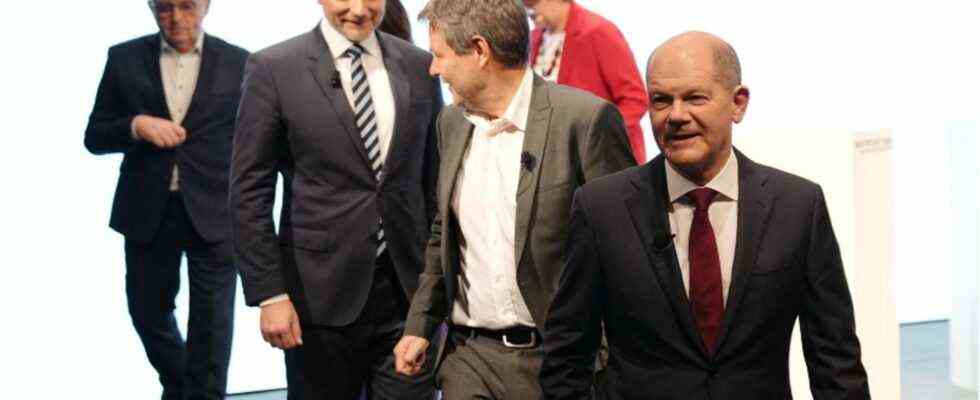Coalition agreement
Ampel-Coalition wants to exploit “an infinite number of potentials” in East Germany
The Ampel coalition is planning to move the “Minister of State for the New Federal States” directly to the Chancellery in the future
© Kay Nietfeld / DPA
The Ampel-Coalition has decided to give the East German federal states more support. However, there are no concrete plans in the coalition agreement. Rather, the East should particularly benefit from the general measures.
If young people are allowed to drive a car at the age of 16 – then they can get around better in the country, then it may be easier for them to find an apprenticeship position and better support their companies. And that, at least at least the FDP politician Hagen Reinhold argues, helps especially the sparsely populated rural areas in East Germany.
Sociologist: Integration of the East hardly recognizable
Like the Liberal from Rostock, the traffic light parties SPD, Greens and FDP rave in unison about the opportunities that their coalition agreement offers, especially for the East German states – not just accompanied driving from 16. “We have endless potentials,” says Reinhold. It is not about an East-West debate or special treatment of the new countries, but “that the whole country benefits”. That is a new approach. Reinhold sees it as a pioneer and role model for change.
The Görlitz sociologist Raj Kollmorgen analyzes the plans a little more soberly, but the bottom line is not that different. “This coalition agreement does not show the intention: Now we are doing something special for the East,” says the professor. From his point of view, 31 years after the unification, that’s also fitting. The traffic light parties tackle various major issues that affect the whole country – but have a particular effect in the east.
Minimum wage, basic child security and coal exit
This can be seen from the SPD paper “22 Points for the East”. Number one of the achievements celebrated by the Social Democrats is the increase in the statutory minimum wage to 12 euros. Applies to everyone, but especially helps in the East, goes the argument. “Regionally, a higher minimum wage would mainly reach employees in the east and north of the republic,” confirms a study by the Hans Böckler Foundation. Brandenburg’s Prime Minister Dietmar Woidke (SPD) sees “many points” in the coalition agreement that people in East Germany in particular are using. “The minimum wage of 12 euros in Brandenburg means a salary increase and more respect for their work for over 360,000 people,” he says as an example.
It is similar with the citizens’ allowance planned instead of Hartz IV or the basic child benefits: In the eastern federal states, social networks are often more important. According to a study by the Bertelsmann Foundation, just under 17 percent of children there lived in Hartz IV families in 2019 – in West Germany it was 13 percent. The SPD paper also mentions the planned capital coverage for the pension or the reduction in electricity prices through the abolition of the EEG allowance for renewable energies as “points for the East”. The particular benefit for Thuringians, Saxons and Brandenburgers is not that obvious.
Above all, the Greens are making the accelerated energy transition a success for the East. “It’s not just about having the earlier coal phase-out, but also about bringing forward structural projects,” says Federal Managing Director Michael Kellner. So the establishment of a university medicine in Cottbus made it into the coalition agreement. The move away from coal, which was brought forward from 2038 to 2030, is also causing a lot of unrest in the East German mining areas.
Not a “blast” in the traffic light coalition agreement
There are not that many targeted East German projects in the 180-page contract. FDP politician Reinhold includes the promise to locate research institutes in East Germany, the restructuring of funding instruments and better representation of East Germans in management positions. For the first time there is a schedule for this. “For the federal level, we will present a concept for implementation by the end of 2022,” says the contract. The search for a location for the “Future Center for German Unity and European Transformation” should begin at the beginning of next year.
And finally, a “Minister of State for the New Federal States” is to work in the Chancellery in the future – the CDU politician Marco Wanderwitz, who was previously responsible for East Germany, was only Parliamentary State Secretary in the Ministry of Economic Affairs. Reinhold thinks it is an upgrade.
The social scientist Judith Enders, once co-founder of the Third Generation East Germany initiative, makes fun of the name of the new position. How much longer will one want to talk about the “new federal states”? Enders asks and would like to think more about terms. Their expectations of the coalition agreement were not that “there is a bang for the East in it”. But she finds the approach “by doing something for everyone, especially for the East”, “a bit lazy”.
Political education, the promotion of democracy, the alleviation of the urban-rural divide, the preservation of daycare centers and clinics in the area, there would be reason for a “somewhat bigger thought process”, believes Enders. “More than half of East Germans feel they are second-class citizens. You have to find measures to counter this.”

